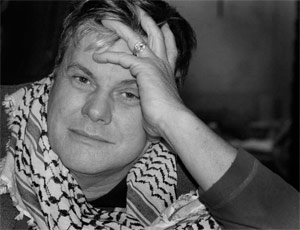Jon Berndt honoured at UCT

Berndt was a doctoral candidate in the Department of Film and Media Studies and an active member of the APC initiative, who died in September this year. His writing on poster art and photography, the archive and early histories of Communism in South Africa and across the world was insightful, and his contributions to the discussions of the research initiative were always original and thought provoking. His absence is strongly felt by the members of the research initiative.
The event took place on the evening of 30 November in seminar room A17 in the Arts Block, which has been renamed the 'Jon Berndt Thought Space' in his honour. A series of 12 original posters designed by Berndt have been hung in the room as a permanent exhibit.
At the ceremony two bound copies of Berndt's last academic paper were presented - one to his wife, Jill, and one to the UCT archives (received by Lesley Hart, who was present at the ceremony). Adrian Kohler and Basil Jones of the Handspring Puppet Company presented Jill with a copy of the play they have dedicated to Berndt.
Jon Berndt was born in Ladybrand in what was then the Orange Free State in 1950. His schooling was fragmented because of the itinerant employment of his father and long periods spent in hospital due to polio. He completed his schooling at Alexander High in Pietermaritzburg in 1970, after which he studied Fine Arts at what was then the University of Natal.
'I was strongly influenced by the radical art movement called Arte Povera, which promoted an art of impoverished materials and contested the power structure of fine art and the gallery system,' he wrote in a biographical text composed for the APC website earlier this year.
Even though his work went against the grain of the style of art promoted by the art school, he received distinctions in practical work and history of art, with strong support from the external examiner, Walter Battiss. While at university he joined the NUSAS cultural organisation, Aquarius, participating in a number of cultural events.
In 1975, he moved to Cape Town where he had been accepted to do a Masters Degree in Fine Art at Michaelis. His thesis, Can art make propositions about the world? Marx and Wittgenstein and the art as language debate, questioned the parallels between language and art and how they expressed/supported political ideologies in the way in which they represented the world.
'I continued to be active in student politics and with the political upheavals of 1976, tensions developed between my supervisor and myself,' he said. 'As a result, Michaelis School of Fine Art informed me that they were not prepared to continue supervising my Masters Degree.'
Berndt began working at the Community Arts Project (CAP) in 1979, where he participated in establishing the Silk-screen Project, which subsequently assisted anti-apartheid organisations to produce political posters from 1982 to 1994. He left his voluntary work with the Project when he married and had two children. While sharing childcare, he worked half days as a freelance designer for trade unions, the International Labour Research and Information Group (ILRIG) and the South African Committee of Higher Education (SACHED).
He returned to CAP in 1989 to develop and run a full time media-training course and completed a diploma in adult education at the University of the Western Cape in 1990. When CAP closed down he continued to work as a freelance poster designer working mainly for New Social Movements, in particular the new SACHED based at the House of Social Movements in Johannesburg, ILRIG and Workers World Media Productions.
'Inspired by the revolutions of the 20th Century, I am working towards a PhD based in the Archive and Public Culture Initiative at UCT, with a dissertation entitled, Posters and Publics: A comparative investigation of Soviet TASS posters and South African struggle posters,' he wrote.
'My archival research on the Cape Town branch of the South African Friends of the Soviet Union (FSU) has focused on the SJ Horvitch Collection (the archive of the Cape Town branch of the FSU) and a collection of seventy six TASS posters that were reported to have been handed in to the South African National Library (SANL) in 1954. TASS (Soviet News Agency) posters were hand-made large format posters made in the 1940s, which emulated the stencil technique and format of the ROSTA (Russian Telegraph Agency) posters that were made shortly after the October 1917 Revolution.
'The posters and the FSU archive became separated. While the FSU archive had seemingly disappeared, the posters were rediscovered lying forgotten on a basement floor in 1991. They had deteriorated to such an extent that the SANL decided to trash them. However, Iziko South African National Gallery intervened and had them restored and currently hold the posters in its permanent collection. The story of the existence of the remaining FSU archive persisted and when I pressed Melanie Geustyn, the librarian in special collections at the SANL, to continue searching for it, she eventually found it under the archival consignation MSB 1004 Communist Party Collection.'